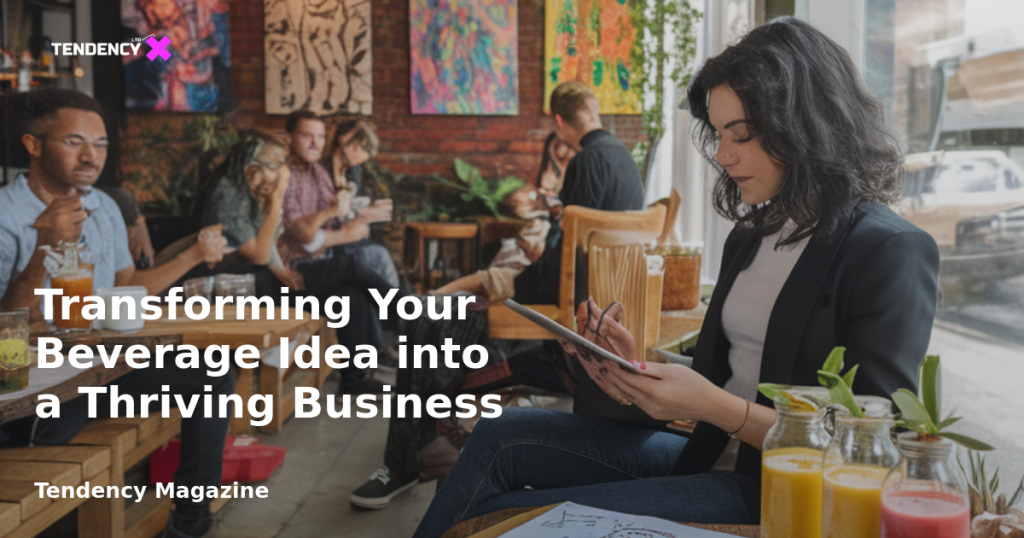Transforming Your Beverage Idea into a Thriving Business

Types of Beverage Businesses
The beverage industry is undergoing a transformative shift as younger generations, particularly Gen Z, move away from traditional alcoholic drinks in favor of health-conscious alternatives that align with their wellness-focused lifestyles. This trend presents a significant opportunity for entrepreneurs with innovative beverage ideas to enter the market and succeed. The time has never been better to launch a creative and tasty new beverage. Here’s how you can turn your beverage vision into a thriving business.
Table of Contents
Types of Beverage Businesses
The beverage industry is diverse, with a range of business categories to explore. Some of the most popular non-alcoholic options include coffee, functional beverages, kombucha, soda, non-alcoholic drinks, and sparkling water. Each of these categories offers unique opportunities for innovation and differentiation.
Coffee
Coffee businesses can take many forms, from independent roasters to dropshippers, cafés, and bottled beverages like cold brews and lattes. The key to success lies in identifying what sets your business apart from competitors. For example, Kloo, a coffee concentrate brand, focuses on quality and simplicity by offering a super-concentrated coffee in refillable glass bottles.
Functional Beverages
Functional health drinks, which include products like mushroom coffee and vitamin shots, have seen significant growth. Consumers are willing to pay a premium for health benefits, especially when these products are convenient. Brands like Clevr Blends and Blume have capitalized on this trend by offering powdered superfood latte mixes that can be easily prepared at home.
Kombucha
Kombucha, a probiotic fermented tea, is another area ripe for innovation. The market offers room for creativity through different brewing techniques and flavor combinations. Better Booch, for instance, started by gathering feedback at local farmers markets before launching their brand, highlighting the importance of customer input in product development.
Soda
The soda market is evolving with new offerings that incorporate healthful ingredients like prebiotics and probiotics. Brands like De La Calle have introduced better-for-you sodas based on traditional recipes, demonstrating how personal connections and cultural heritage can help a product stand out.
Non-Alcoholic Alternatives
The market for non-alcoholic beverages is growing rapidly, with predictions it will be worth $4 billion by 2027. Products like tonic seltzers with adaptogens and nootropics are gaining popularity, offering consumers a sense of well-being without alcohol. Brands such as Ghia have successfully created non-alcoholic aperitifs inspired by personal experiences, catering to those seeking complex flavors without the guilt of alcohol.
Sparkling Water
The demand for sparkling water has surged, driven by the rise of non-alcoholic alternatives. While mainstream brands dominate, smaller businesses like City Seltzer have found success by creating unique flavors and leveraging existing relationships with local distributors.
How to Start a Beverage Company
Starting a beverage company involves several key steps, from establishing a road map to leveraging lifestyle content to build a community around your product.
1. Establish a Road Map
Begin by documenting your concept in detail and developing a strategy. Define your specific beverage category and conduct thorough market research to understand financial trends and consumer interest. Write a business plan that includes goals, financial projections, and marketing strategies.
2. Secure Funding
Launching a beverage company requires significant capital. Explore options like small business grants, angel investors, and networking opportunities to secure the necessary funding. Platforms like AngelList and StartEngine can connect you with potential investors.
3. Develop a Recipe
Recipe development is crucial. Your drink must appeal to diverse palates and be scalable. Collaborate with a commercial beverage formulator or an independent food scientist to refine your recipe and ensure it can be produced at scale.
4. Find Manufacturers and Suppliers
Partner with experienced manufacturers and suppliers who understand your needs. Ensure they can meet your production requirements and maintain a reliable supply chain.
5. Comply with FDA Regulations
Understand and comply with FDA regulations for food safety. Ensure any manufacturing facility you work with is registered and follows these regulations, especially if making health-related claims about your product.
6. Perform Pilot Testing
Gather feedback on your product through pilot testing. This can involve soft launches, crowdfunding campaigns, or direct feedback from trusted peers. Be open to making changes based on this feedback to improve your product.
7. Seek Distribution
Decide on your distribution strategy, whether direct-to-consumer or wholesale. Build relationships with local distributors and shop owners to get your product on retail shelves.
8. Create Branding and Marketing
Develop a strong brand identity that includes your company name, logo, packaging design, and social media presence. Use storytelling to highlight what makes your product unique and connect with your audience.
9. Leverage Lifestyle Content
Build a community around your product by positioning it within a larger lifestyle context. Engage with niche communities and create content that resonates with your target audience.
Conclusion
Transforming a beverage idea into a successful business requires careful planning, creativity, and a willingness to adapt. By understanding market trends, securing funding, developing a unique product, and building a strong brand, you can tap into the growing demand for innovative beverages and create a thriving business. With the right approach, your beverage idea can become the next big thing in the industry.
2025 Tendency LTD. All rights reserved.

